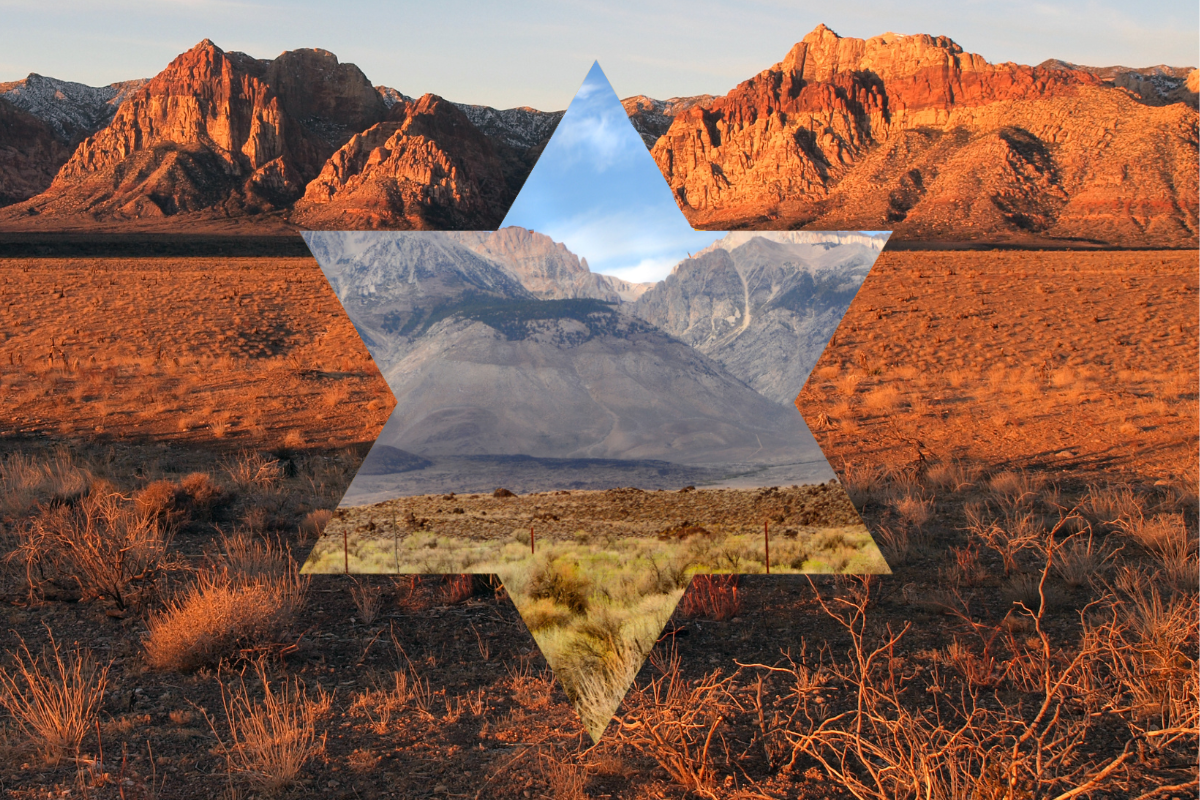Jewish people have an obsession with the desert which I find impossible to understand. Sure, we wandered through the desert in the Book of Exodus, obsess over TEVAs versus Birkenstocks and many of us call Israel and Los Angeles home. But, as a community, we also have a long and storied past that is full of complaining about the heat, sweating and being uncomfortable — all prominent features of living in a desert. In my view, our aim isn’t really to live in a desert, but to find our promised land, which just so happens to be in a desert. It is the guarantee of this oasis, this mirage, that keeps Jewish desert communities going.
I hail from the mirage of Las Vegas, Nevada; a city in the middle of the Sahara of the southwest U.S. (the Mojave Desert) that seems far too good to be true and whose existence I still don’t quite comprehend. Much like the land of milk and honey that we grow up hearing stories about, I grew up in a desert of abundance — a place where the Jewish community has been able to thrive in spite of the blazing sun and harsh land conditions. Except, instead of a land of milk and honey, I grew up in a land of free drinks, slot machines and strip clubs.
While Jewish life in Las Vegas can be traced back to the beginning of the 20th century, the city really became a Bar Mitzvah Bonanza in 1946 when Jewish mobsters Bugsy Siegel and Moe Dalitz invested in the valley’s famous Las Vegas Strip. Tragically, Siegel’s belief in the Flamingo Hotel and Casino had a rocky start. Within a year of opening, the mob decided to kill two birds with one stone — the Flamingo was closed due to a lack of profits, and Siegel was murdered. (This didn’t end the mob’s involvement in the development of the Strip, though, as they would continue to be in financial control of the gambling paradise well throughout the 1980s.)
And so, seeing a strong, albeit unorthodox semblance of their Hebrew heritage in this savannah of sin, Jews flocked to the boomtown in search of their mirage and a fresh start. Growing up, I can distinctly recall dubious drashes (or sermons) given by the many adults in my upbringing who had done jobs for the mob in some form — knowingly or unknowingly. In the Vegas Jewish community, we don’t bat an eye when we learn that the woman who teaches children the aleph-bet at the (former) Moe Dalitz Jewish Day School was also carrying briefcases from one building to another, knowing that she could never ask what was inside of them.
But Jewish life in Las Vegas isn’t all organized crime and rainbows. If spiritual sadism is your cup of tea, try spending Yom Kippur in 96-degree heat, the average daily high for a late September or early October day in my hometown. I promise you that you’ll experience the most rewarding break fast of your life after spending 25 hours praying on your feet in a dry heat under the weight of your tallit. Don’t start kvetching yet though, because Tisha B’Av fasting takes place during the cool July average heat of 107 degrees, at which point you’ll be making quality air conditioning a permanent priority in your life.
Of course, we have to have fun at some point, it’s Vegas, Baby! The City of Lights does indeed shine big and bright for our beloved minor holiday Hanukah, boasting public menorah lightings all across the city. You may be thinking to yourself, “What’s so special about that? My city has candle lightings too.” And to you I say, does your city have performances by the world-famous Dancing Dreidels? Appearances by your Jewish mayor, who also happens to be the wife of a former mob lawyer (who was also once the mayor of Las Vegas)? Desserts catered by the very Jewish Freed’s Bakery, subject of the Food Network show “Vegas Cakes”? I think not.
I think not because it is very likely that you, dear reader, did not grow up in a mirage and do not live in one now. It is far more probable that you grew up in a regular-degular city, suburb or rural plane of existence. And that’s awesome for you. But I grew up in a city that is fundamentally strange, unpredictable and fantastic. As I now explore life beyond this invented valley full of quirks and shady politics, I miss the convenience of the (other) city that never sleeps. Truly, the first time I learned that restaurants in many localities close at the early hour of 8 p.m., a single tear rolled down my cheek. When I found that mezuzot outside of Las Vegas are not bedazzled, that cantors across the country are not hosting Beatles Shabbats, that most people haven’t asked themselves if mob bosses blew shofars — I came to realize that my reality, and the reality of everyone from Las Vegas, is nowhere near normal. I feel special – chosen, even – knowing that I am but a small part of this abnormality that is beloved around the world.
Maybe it is the destiny of the Jewish people to live in the comfort of a mirage, maybe there’s a reason some of us keep returning to the desert. After all, our ancestors wandered the desert aimlessly for 40 years to find their slice of paradise in the dry heat, surrounded by sand and dust and covered in an endless sun. Didn’t they deserve an all-you-can-eat buffet after all that schlepping?



